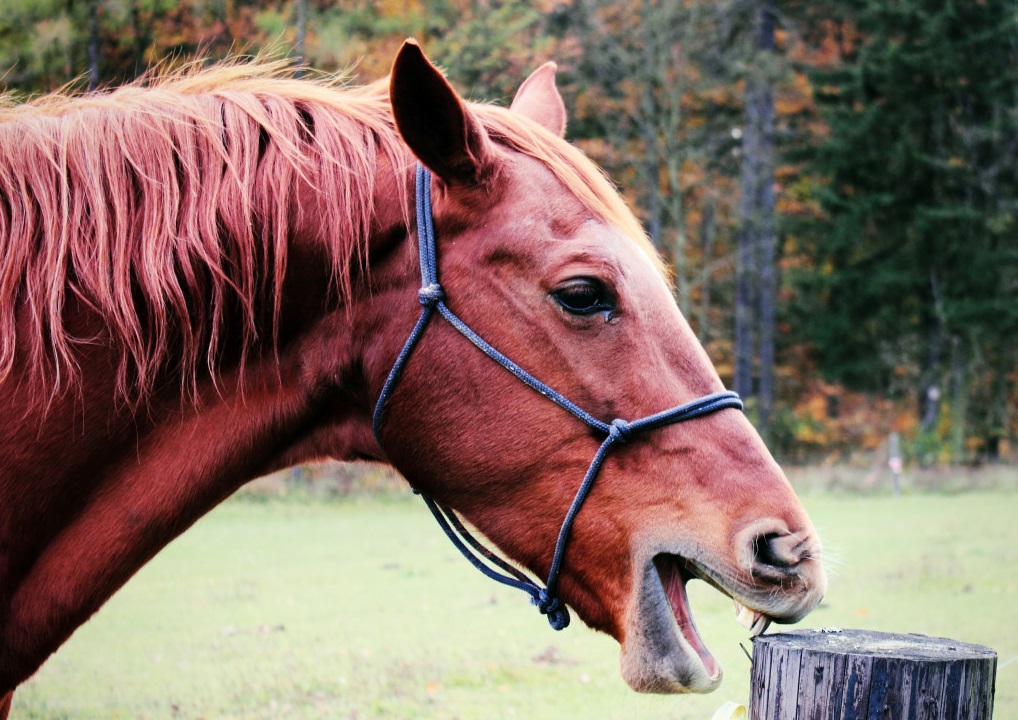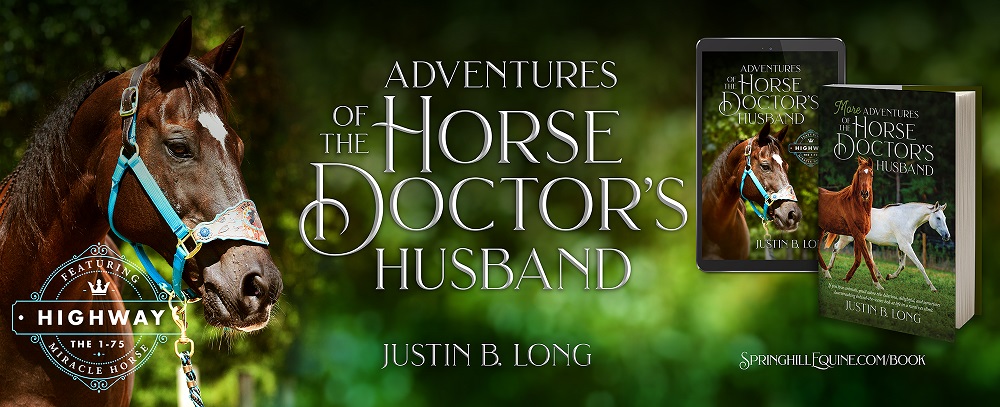Tuesdays with Tony
Cribbing
Everyone has a bad habit or two. Yes, even your horse. I know you’re thinking, there is no way my horse has any bad habits, he is perfect in every way. I hate to break it to you, but the only animals in the world with no bad habits are cats. While your horse might be close to perfect, he will never be as perfect as a cat. Some horses kick, some horses bite. Others weave, paw, or dig. The bad habits horses can have are innumerable. One that most horse people are familiar with and one I hear much grief about is cribbing.
If you’ve spent any time around horses, you are likely familiar with a horse who cribs. You are also probably familiar with the negative connotation that goes along with a horse who cribs, but are you familiar with why horses crib or the risk associated with cribbing? And do you know how to help prevent a horse from cribbing? No? Well, that’s okay, that’s what I’m here for.
Why do horses crib?
First, I should define what cribbing is for you. Cribbing is when a horse places his teeth on a solid object, pulls back, and sucks air into his upper esophagus with that lovely grunting noise you all are familiar with. The noise horses make when cribbing is very distinct. Beyond the annoying sound, horses that crib can cause damage to stall walls, fences, and other structures around the barn.
Cribbing is a stereotypical behavior, as are weaving and stall walking. That means they aren’t actually habits, but rather a compulsive behavior. I’ll call it a habit in this blog, as it’s easier for me to type and you to read, but just so you know, it’s more than a habit.
It is often thought that horses crib out of boredom. While there may be a boredom component, the reason horses crib is still largely unknown. It’s not understood why some horses develop cribbing while others don’t despite identical management. There is some research suggesting there may be a genetic factor that predisposes certain horses to develop the habit of cribbing which is why we see more thoroughbreds that crib than other breeds. That being said, management may also play a role in compulsive behaviors such as cribbing. Horses who are fed high concentrate feeds, have minimal turnout and little to no socialization are more prone to start cribbing. As you well know, horses are foragers as well as herd animals. Therefore, when their lifestyles do not reflect what their bodies were made for, they tend to develop coping mechanisms such as cribbing to deal with the stresses of an unconventional lifestyle.
Current research shows cribbing may be associated with lower stomach pH. In other words, if your horse’s management makes them prone to ulcers, it makes them prone to crib. Oddly, cribbing is associated with increased endorphins prior to the behavior! In other words, your horse gets a hit of endorphins, then cribs in response. Not the other way around like we’ve always thought. Cribbers also have lower cortisol levels when they are allowed to crib. This behavior may actually help your horse cope with stress!
Risks associated with cribbing
The theme I’m seeing with cribbing and horses is that there really aren’t any clear-cut answers. And if you know me, you know how much I like black and white answers. For some unknown reason, horses that crib are more prone to a certain type of colic. The limited research out there points to the pressure created within the abdominal cavity during cribbing as being a possible causative agent of a colic called an epiploic foramen entrapment. This is a type of colic in which the small intestine becomes trapped in a hole between the liver and pancreas. The only way to resolve this kind of colic is with surgery.
The idea is that, as horses crib and the pressure changes within the abdomen, the hole opens up and the small intestine can migrate through. Then, when the pressure normalizes, the hole returns to its normal size and the intestine gets stuck. When the intestine is stuck, the blood supply is cut off and starts to strangulate the small intestine resulting in a severe colic.
Cribbers also do damage their teeth as they are cribbing on all the fun things they find around the farm to grab. This leads to early loss of their incisors. However, for the most part they handle this just fine thanks to modern horse diets.
“Treatment”
While there is no real treatment for cribbing, there are ways to prevent and discourage your horse from cribbing. Unfortunately, once a horse has started cribbing, it’s nearly impossible to break that habit. In fact, that current research about endorphins means that totally eliminating cribbing from your horse’s life may very well increase their stress levels.
Occasionally cribbing can be related to gastric ulcers, but an endoscopic examination is the only way to confirm the presence of ulcers. If ulcers are confirmed, and your horse is showing signs of cribbing, a change in diet is essential. A diet high in forage, particularly alfalfa hay, can reduce stomach acid and reduce the risk of ulcers. Similarly, since horses are grazing animals, having hay in front of your horse at all times if they are not out grazing can reduce the frequency of cribbing observed. This is especially important in young horses since this is when they establish the behavior.
Since horses are herd animals, you may find that your horse’s cribbing habit is reduced if you allow him time to socialize with other horses. Horses tend to follow each other and if your horse’s new friend isn’t seeking out somewhere to crib, your horse may not seek out a place to crib either. Toys and enrichment devices are also an excellent tool to keep your horse occupied and reduce their frequency of cribbing. They can also help to keep your horse moving around and exercising which can reduce stress as well.
Of course, there are also several devices that have been developed to reduce cribbing mechanically. Cribbing straps and muzzles certainly have their place in a barn. There are many different cribbing straps out there, so be sure to talk with your vet about which once is right for you and your horse. The goal of the cribbing strap is to prevent your horse from being able to suck wind into his esophagus. However, cribbing straps do not prevent your horse from trying to crib. This means that they may still seek out solid structures to try to crib on. Occasionally, topical paints or sprays can be applied to stall walls and fencing to deter horses from cribbing. These require frequent re-application and are sometimes easily washed away. Even more, some horses like the taste and it does not deter them at all. I tell ya, horses are just silly animals. They should just be smarter, like us cats.
No matter what method you choose, it’s unlikely you’re going to get rid of cribbing all together. Set your horse up for success by giving them someplace acceptable to crib for at least a portion of the day. If possible, use a piece of soft wood, like a non-pressure treated 2×4, somewhere they frequent set up at a height they like. This can be done in a stall or in a pasture. In the pasture, placing it near the water trough or hay feeders will usually draw your horse in.
Cribbing can be a frustrating habit to deal with, but don’t let it deter you from your dream horse. Lots of horses crib, but it doesn’t mean they can’t perform their jobs and excel in them. If you have questions about cribbing and what it means for you and your horse, give my docs a call. They would love to talk more in-depth with you.
Until next week,
~Tony
P.S. If you have a cribber, you really, really want to take the time to listen to the podcast my docs produce. They have an episode all about cribbing and other stereotypical behaviors, and they interview Dr. Wickens, who is one of the leading researchers on stereotypical behaviors. It’s a fantastic conversation, and you can find it over on the Podcast Page.
Tuesdays with Tony is the official blog of Tony the Clinic Cat at Springhill Equine Veterinary Clinic in Newberry, Florida. If you liked this blog, please subscribe below, and share it with your friends on social media! For more information, please call us at (352) 472-1620, visit our website at SpringhillEquine.com, or follow us on Facebook!
[jetpack_subscription_form title="Subscribe to Whinny's Wisdoms"]


